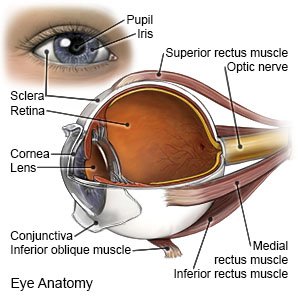Eye Foreign Body in Children
Medically reviewed by Drugs.com. Last updated on Aug 4, 2025.
Your child may have pain, sensitivity to light, or blurry vision for a few days.
 |
DISCHARGE INSTRUCTIONS:
Return to the emergency department if:
- Your child suddenly loses his or her vision.
- Your child has severe eye pain.
Call your child's doctor or ophthalmologist if:
- Your child has new or worse eye swelling.
- Your child's symptoms do not get better, even after the foreign body is removed.
- Your child has white or yellow fluid draining from his or her eye.
- You have questions or concerns about your child's condition or care.
Medicines:
Your child may need any of the following:
- Eye drops or eye ointment may be given to prevent an infection and decrease pain.
- NSAIDs , such as ibuprofen, help decrease swelling, pain, and fever. NSAIDs can cause stomach bleeding or kidney problems in certain people. If you take blood thinner medicine, always ask your healthcare provider if NSAIDs are safe for you. Always read the medicine label and follow directions.
- Prescription pain medicine may be given. Ask your child's healthcare provider how to give this medicine safely. Some prescription pain medicines contain acetaminophen. Do not give your child other medicines that contain acetaminophen without talking to a healthcare provider. Too much acetaminophen may cause liver damage. Prescription pain medicine may cause constipation. Ask your child's provider how to prevent or treat constipation.
- Give your child's medicine as directed. Contact your child's healthcare provider if you think the medicine is not working as expected. Tell the provider if your child is allergic to any medicine. Keep a current list of the medicines, vitamins, and herbs your child takes. Include the amounts, and when, how, and why they are taken. Bring the list or the medicines in their containers to follow-up visits. Carry your child's medicine list with you in case of an emergency.
Help your child's eye heal:
- Tell your child not to rub his or her eyes. This may cause more damage or infection.
- Tell your child not to wear his or her contacts lenses until the eye heals. Your child should only wear glasses until directed. This will give your child's eyes time to heal.
- Have your child wear sunglasses as directed. Sunglasses help protect the eye and decrease sensitivity to light.
Prevent another EFB:
- Have your child wear protective eyewear. Your child should wear protective eyewear when he or she works with chemicals, metal, or wood. Your child should also wear protective eyewear during sports such as racquetball or swimming. Make sure the eyewear wraps around the sides of your child's face. Do not let your child use regular eye glasses for eye protection. They will not protect your child's eyes from foreign bodies or chemicals.
- Make sure your child uses contact lenses as directed. Tell your child to wash his or her hands before he or she cleans, inserts, or removes contacts. Your child should insert and remove contact lenses correctly. Have your child clean and change contacts as directed to help prevent eye damage or infection.

Follow up with your child's doctor or ophthalmologist as directed:
Write down your questions so you remember to ask them during your visits.
© Copyright Merative 2025 Information is for End User's use only and may not be sold, redistributed or otherwise used for commercial purposes.
The above information is an educational aid only. It is not intended as medical advice for individual conditions or treatments. Talk to your doctor, nurse or pharmacist before following any medical regimen to see if it is safe and effective for you.
Further information
Always consult your healthcare provider to ensure the information displayed on this page applies to your personal circumstances.
